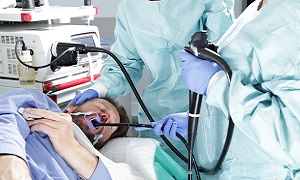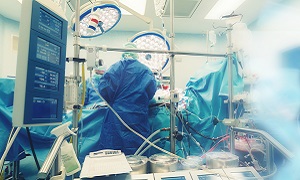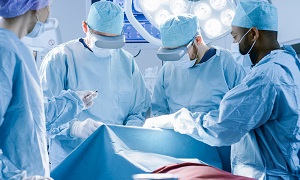Best Oncologists for Stomach Cancer Treatment in India
Best Stomach Cancer Treatment Hospitals in India
- City: Mumbai, India
Hospital Highlights:
- Fortis Hiranandani hospital was established in 2007.
- The hospital is an advanced tertiary care, multi-specialty hospital equipped with 149 beds.
- The hospital is equipped with a super ICU to provide emergency medical care to critically ill patients.
- The hospital is NABH accredited.
- The critical care facility in the hospital is augmented with the state-of-the-art facilities that facilitate speedier diagnosis and efficient monitoring.
- The hospital provides specialty medical services in cardiology, orthopedic science, pediatric science, neurology, diabetic care, urology, nephrology, ENT, obstetrics, gynecology, cosmetic surgery, bariatric surgery, neuro and spine care.
- City: Gurugram, India
Hospital Highlights:
- W Pratiksha Hospital, Gurugram, is one of the best hospitals in the NCR region. It is also a top hospital in India for IVF. Since its inception, the hospital has performed over 5500 successful IVFs. The hospital also specializes in gynecology.
- With over 20 years of experience in providing quality healthcare, the hospital is known as one of the most trusted and valued health providers in India.
- Equipped with world-class medical facilities and advanced technology, the hospital’s doctors and clinicians also have a track record of delivering excellent results. The hospital is also known for focusing on preventive well-being as much as on curative treatment.
- The hospital has earned the trust of its patients, by providing the best available treatments at affordable costs.
- City: Gurugram, India
Hospital Highlights:
- Paras hospital was established in 2006 and is the 250 bedded flagship hospital of Paras Healthcare.
- The is supported by a team of doctors of international and national repute.
- The hospital is NABH accredited and also the first hospital in the region to have a NABL accredited laboratory.
- The hospital provides specialty medical services in around 55 departments including Neurosciences, Joint Replacement, Mother & Child Care, Minimal Invasive Surgery, Gynecology and Obstetrics, Ophthalmology, Dermatology, Endocrinology, Rheumatology, Cosmetic and Plastic surgery.
- The hospital is equipped with state-of-the-art technologies.
- City: Kolkata, India
Hospital Highlights:
- Fortis Hospital, Anandapur, Kolkata is a world-class super-speciality equipped with the latest technologies in the medical world.
- The hospital is NABH accredited.
- This state-of-the-art facility specializes in cardiology and cardiac surgery, urology, nephrology, neurosciences, orthopaedics, digestive care, emergency care and critical care.
- The hospital, governed by integrated Building Management System (IBMS), has a pneumatic chute system, for quick vertical and horizontal transportation between floors, facilitating speedy transfer of patient specimens, documents, reports, and medicines to the concerned departments.
- The hospital also has a nephrology department with over 28 advanced dialysis units.
- City: Mumbai, India
Hospital Highlights:
- SL Raheja hospital is a 140-bed multi-specialty tertiary care hospital that is being managed by Fortis Healthcare Ltd.
- The hospital is a benchmark in healthcare and medical facilities in the neighborhood of Mahim & the western suburbs.
- L.Raheja Hospital, Mahim has one of the most effective ICU and Casualty care services.
- The hospital provides specialty medical services in Cardiology, Oncology, Neurology, Orthopedics, Mother & Child Care, and in Diabetes.
- City: Mumbai, India
Hospital Highlights:
- Wockhardt Hospitals were established in the year 1973, originally called First Hospitals and Heart Institute.
- Wockhardt Hospitals are super specialty health care networks in India, nurtured by Wockhardt Ltd, India’s 5th largest Pharmaceutical and Healthcare company.
- Wockhardt Hospitals is associated with Partners Harvard Medical International, an international arm of Harvard Medical School, USA.
- Wockhardt Heart Hospital performed India’s first endoscopic heart surgery.
- The hospital has a state-of-the-art infrastructure equipped with the latest technologies and modern equipment.
- It has special Centers of Excellence dedicated to the major specialties to provide hassle-free and high-quality clinical care.
- City: Gurugram, India
Hospital Highlights:
- The CK Birla Hospital in Gurugram is a NABH-accredited multi-specialty hospital.
- The hospital strives to increase the quality of healthcare by focusing on UK NHS nurse and midwife training requirements. Policies and practices derived from the National Institute for Health and Treatment Excellence (NICE) recommendations in the United Kingdom ensuring that a strong focus on safety, high-quality clinical care, and sanitation is maintained.
- The hospital’s cutting-edge technology and facilities allow for real-time communication and seamless collaboration among caregivers, ensuring accuracy and the best possible results. Those with foreign experience and accreditations make up part of the hospital’s team of clinicians.
- City: Ahmedabad
Hospital Highlights:
- As a member of the Apollo Hospitals Group, Apollo Hospitals International Limited, Ahmedabad is one of the most popular and sought-after medical facilities in Gujarat.
- Through its 6 Centres of Excellence and various affiliated branches, which cover all specialties and subspecialties, the hospital provides the most advanced clinical services.
- Since its inception in 2003, the hospital has been providing each patient with the most up-to-date medical equipment and state-of-the-art technology.
- With more than 150 successful organ transplants, including liver and renal transplants, the facility has been able to build a strong and extensive organ transplant program.
- In addition to performing 600 surgeries and caring for over 1800 patients on an IP basis, the hospital sees more than 18,000 patients on average in the outpatient department.
- With one of the biggest cardiology teams in the area, the hospital provides state-of-the-art regional care treatment in Cardiac Sciences.
- Additionally, the hospital offers a broad range of Neuro Interventional techniques to help stroke patients recover more quickly.
- City: Noida, India
Hospital Highlights:
- Jaypee Hospital is the flagship hospital of the Jaypee Group.
- This hospital has commissioned 525 beds in the first phase and has been planned and designed as a 1200 bedded multi-specialty facility.
- It holds the accreditation of the NABH and NABL.
- The hospital has state-of-the-art infrastructure equipped with the latest technologies and modern equipment like 64 Slice PET CT, Dual Head 6 Slice SPECT CT, Gamma Camera, and Da Vinci Robotic Surgery for comprehensive robotic surgical solutions.
- It has special Centers dedicated to the major specialties to provide hassle-free and high-quality clinical care.
- City: Mumbai, India
Hospital Highlights:
- Reliance Hospital is one of the best super-specialty care hospitals in Navi Mumbai.
- The main purpose of this hospital is to become a trustworthy place for the best health and hope for society. The hospital is well connected to the suburbs of Mumbai and Navi Mumbai.
- The hospital has various specialty departments, viz., Accident & Emergency, Anesthesiology, Dental Services, Dermatology, Diabetology, Dietetics Nutrition, Endocrinology, ENT, Gastroenterology, General Surgery, Gynaecology And Obstetrics, Hepato Pancreato Biliary Surgery, Infectious Disease, Internal Medicine, Interventional Radiology, Laboratory Medicine, Minimal Access Laparoscopic Surgery, Nephrology, Neurosciences, Opthalmology, Orthopaedics, Paediatrics, Pain Management Palliative Care, Physical Medicine Rehabilitation, Plastic And Reconstructive Surgery, Psychiatry, Pulmonary Medicine, Radiology, Rheumatology, Transplant, Urology Andrology, Vascular Surgery
Stomach Cancer
Stomach Cancer is the growth of cancerous cells within the lining of your stomach. There is a possibility that these calls might grow into a tumor. Also known as gastric cancer, this type of cancer grows slowly over several years, and is difficult to diagnose, as patients don’t show symptoms in the early stages.
Sometimes, it even goes undiagnosed until it spreads to other parts of the body, making it more difficult to treat.
Symptoms
There are generally various signs and symptoms of stomach cancer, and some of them include:
- Feeling bloated after a meal
- Difficulty swallowing
- Feeling full after eating small amounts of food
- Nausea
- Stomach pain
- Heartburn
- Vomiting
- Indigestion
- Unintentional weight loss
Causes & risk factors
Modern science is still researching what exactly makes cancer cells grow in the stomach. Few things are known to increase your risk for the disease. One of them is infection with bacteria which causes ulcers. Inflammation in your gut, which is known as gastritis can also increase the risk. Pernicious anemia, which is a type of long-lasting anemia, and certain growths in your stomach known as polyps are also known to make you more likely to get cancer.
Few other factors that might increase the risk of stomach cancer include:
- Smoking
- A diet high in smoked, pickled, or salty foods
- Being obese or overweight or obese
- Type- A blood
- Working in coal, timber, metal, or rubber industries
- Epstein-Barr virus infection
- Stomach surgery for an ulcer
- Exposure to asbestos
- Certain types of genes
Stages of Stomach Cancer:
Stage 1: Cancer is present in the inner lining of the stomach.
Stage 2: Cancer has spread into the deeper layers of stomach & nearby lymph nodes.
Stage 3: Cancer has spread to all the layers in the stomach as well as to the nearby organs like spleen or colon.
Stage 4: Cancer has spread far and wide to organs like the liver, lungs, or brain.
Diagnosis
There are several tests and procedures which are used in order to diagnose stomach cancer.
Upper endoscopy
Biopsy
Imaging tests
Your doctor will need to determine the stage of your stomach cancer before he/she can decide which treatment option is best for you. Tests and procedures which are used to determine the stage of cancer include:
Blood tests
Imaging tests
Imaging tests generally include positron emission tomography (PET) and CT scans.
Exploratory surgery
Your doctor may also need to perform surgery to check if cancer has spread beyond your stomach, within your chest, or your abdomen. Exploratory surgery is usually done laparoscopically. This means the surgeon will be making several small incisions in your abdomen and next insert a special camera that transmits images to a monitor in the operating room.
Depending on your situation, other staging tests might be used as well.
The information from these procedures might be used by your doctor to assign a stage to your cancer, which ranges from 0 to IV. The lowest stage indicates that the cancer is quite small and has affected only the stomach’s inner layers. However, by stage IV, the cancer is considered to be quite advanced and may have spread to other areas of the body.
Treatment
Surgery
The goal of surgery is removing all of cancer, as well as some of the healthy tissue around it.
Operations that are used for treating stomach cancer can include:
Removing early-stage tumors from the lining of the stomach
Subtotal gastrectomy
Total gastrectomy
Total gastrectomy involves the removal of the entire stomach as well as some surrounding tissue. After this, the esophagus is connected directly to your small intestine so that food is able to move through your digestive system. Total gastrectomy is generally meant for stomach cancers affecting the body of the stomach as well as those located in the gastroesophageal junction.
Removing lymph nodes to look for cancer
Surgery to relieve signs and symptoms
Radiation Therapy

Radiation therapy is a form of cancer treatment, that uses high-powered beams of energy, such as protons and X-rays to kill cancer cells. In this method, you lie on a table, over which a machine moves around you, sending the energy beams.
Sometimes, radiation therapy might be used before surgery as well, in order to shrink cancer, so that it can be removed more easily.
Radiation therapy is also used after surgery to kill any cancer cells that might be remaining. It is also often combined with chemotherapy.
Chemotherapy
Chemotherapy is a drug treatment that makes use of chemicals to kill cancer cells. The drugs travel throughout the body and kill the cancer cells that might have spread through the stomach.
This treatment might be given before surgery as well, to help shrink cancer so that it might be removed more easily. Chemotherapy is also used after surgery to kill any cancer cells that might be remaining in the body. Sometimes it might also be combined with radiation therapy.
In people with advanced stomach cancer, it might also be used in combination with targeted drug therapy.























